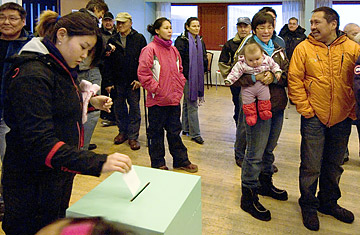
Cecilie Markussen casts her vote in the box in Nuuk, Greenland, on November 25, 2008. Greenlanders began voting Tuesday in a referendum on self-rule.
The day started with a party. Greenlanders marched through the center of the capital, Nuuk, in the shadow of the hilltop statue of Danish missionary Hans Egede who sailed to shore there 300 years ago. They marched past the red-and-white Danish flags flapping in the inclement weather of the sparse low-slung city, past the shops with Danish-import goods and the pubs with Carlsberg on tap, as voters living around the rocky fringe of the world's largest island got ready to take their own historic vote on Tuesday.
By the end of the day, the semi-autonomous territory of Denmark had taken a symbolic leap toward independence, as 75% of voters said "yes" to bringing a new status of self-rule to the island. Though Greenland was awarded limited self-governance in 1979, Denmark retains control over the territory's foreign relations, security, justice system and half of its income from natural resources. Tuesday's non-binding referendum, in which over 28,200 voters cast ballots, means some of those responsibilities could transfer into Greenlandic hands once approved by Danish and Greenlandic parliaments. There is a long list of new responsibilities Greenlandic government might take on — including managing and financing its own criminal justice system, and making the Inuit language of Greenlandic, spoken by the vast majority of Greenland's 57,000 inhabitants, the island's official language. (Copenhagen will still manage Greenland's foreign relations and defense, and Danish law will still apply here.) "The future of a country depends on being able to move beyond the past, without forgetting it," says Josef Motzfeldt, an MP and leader of the Inuit Brotherhood political party. "I can feel that people are very excited and very anxious to give this country more self determination."
The vote does not signal an immediate shift, but at 72 degrees north, on some of the oldest land on the planet, things do not always move at a fast clip in Greenland. Many of the salt-and-pepper heads that sit in Nuuk's Scando-modern parliament building today have been lobbying for independence since the 1970s. In an era when many countries around the world were breaking free from their colonizers, a group of young activists formed the island's own independence movement. By 1979, Denmark granted Greenlanders, about 90% of whom are Inuit, the right to manage their own domestic affairs, but maintained sovereignty over foreign affairs and natural resources —that second perhaps more vexing to many in the island's Home Rule government that has had its seat in Nuuk since 1979. Copenhagen also continued to give the territory a large annual subsidy that amounts to about $600 million a year — nearly 30% of the island's income. Presently, Denmark derives minimal income from Greenland and its undeveloped resources.
Despite the mandate for change that the Greenlandic government has now been given, that umbilical cord of cash has many unconvinced that true independence will happen anytime soon — if ever. With no major road system and over 80% of the island covered in the famously melting Greenland ice cap, building up the island to a state of self-sufficiency will not be not easy. Unemployment hovers at 9%; alcoholism and suicide haunt Nuuk and the hundreds of villages that fringe the coast. Shrimp and halibut exports prop up the island's economy, and some of the small mining operations scattered around the southern parts of the island have begun to pull out during the economic slump. "If they are not prepared to reduce their standards of living, then they have to experience high rates of growth for a long time. Or find minerals," says Steen Ryd Larsen, head of the Danish government's North Atlantic Secretariat.
Those minerals are exactly what many hopes have been pinned on for years — specifically, oil and natural gas. The United States Geological Survey estimates there could be the equivalent of as much as 31 billion barrels of oil off Greenland's northeast coast alone, potentially making it the 19th largest oil and gas province in the world. Greenland itself estimates the west coast could hold even more. But even if one of the several foreign oil companies with exploratory rights off the west coast of Greenland today does strike it big, Greenland and Denmark will have to haggle over who gets rights to the revenues that may exceed $600 million a year.
But to dwell on the petrochemical consequences of Greenland's historic vote is missing the point — at least for today. Greenland has never garnered a lot of global attention, and when it has, it's often been the wrong kind. In addition to the Danish navy ships that patrol its coast and the Danish soldiers that patrol parts of its icy interior, the American military has maintained a base in the far north of the island since the 1950s, displacing Inuit hunters and later leaving an undetonated hydrogen bomb still missing somewhere in Greenlandic waters. But as global warming has become an international concern, Greenlanders feel they have become a more relevant voice in the world's affairs, bearing witness to a major change on the planet and hosting thousands of scientists in recent years. On this day in Nuuk, where temperatures dipped well below freezing, people were not so much voting "yes" on taking over the administration of the island's lighthouses or domestic veterinary affairs (both on the long self-rule "to-do" list), but "yes" on striking out on a path toward becoming the world's first independent Inuit state. "The world is focusing on what Greenland is doing," says Motzfeldt. "We can give the rest of the world what we have, and we can receive the same inspiration from the world around us." And as the final "yes" vote came in, the day ended as it began: with a party.
